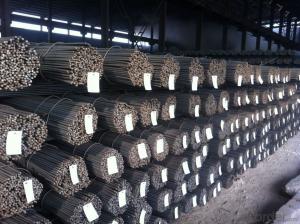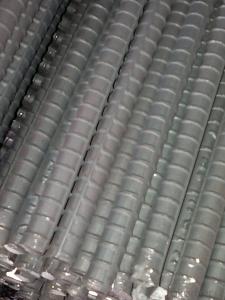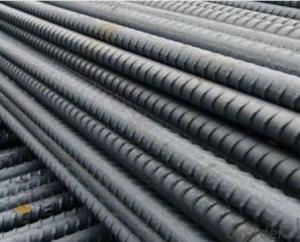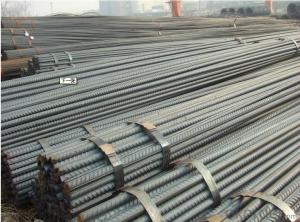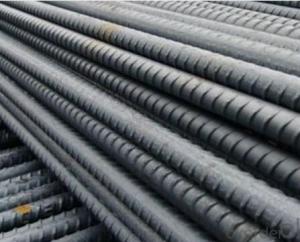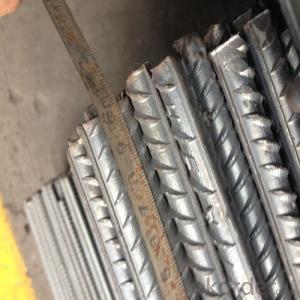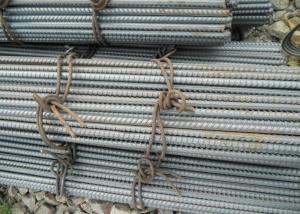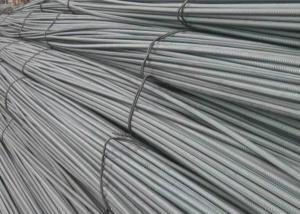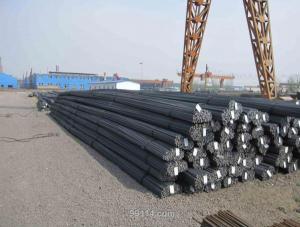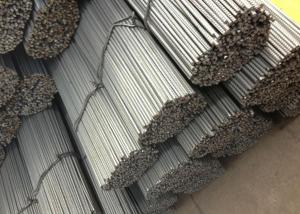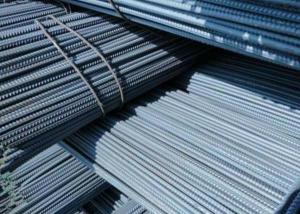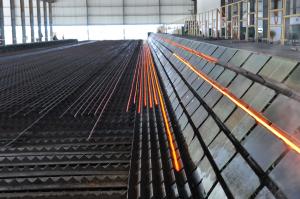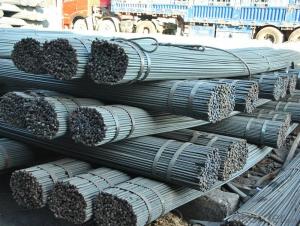Deformed Steel Rebars for Construction Concrete
- Loading Port:
- China main port
- Payment Terms:
- TT OR LC
- Min Order Qty:
- 100 m.t.
- Supply Capability:
- 10000 m.t./month
OKorder Service Pledge
OKorder Financial Service
You Might Also Like
Product Description:
OKorder is offering Deformed Steel Rebars for Construction Concrete at great prices with worldwide shipping. Our supplier is a world-class manufacturer of steel, with our products utilized the world over. OKorder annually supplies products to African, South American and Asian markets. We provide quotations within 24 hours of receiving an inquiry and guarantee competitive prices.
Product Applications:
Deformed Steel Rebars for Construction Concrete are ideal for structural applications and are widely used in the construction of buildings and bridges, and the manufacturing, petrochemical, and transportation industries.
Product Advantages:
OKorder's Deformed Steel Rebars for Construction Concrete are durable, strong, and wide variety of sizes.
Main Product Features:
· Premium quality
· Prompt delivery & seaworthy packing (30 days after receiving deposit)
· Can be recycled and reused
· Mill test certification
· Professional Service
· Competitive pricing
Product Specifications:
Manufacture: Hot rolled
Grade: HRB335,HRB400,HRB500
Certificates: ISO, SGS, BV, CIQ
Length: 6m – 12m, as per customer request
Packaging: Export packing, nude packing, bundled
Deformed Steel Bar | ||
Diameter (MM) | Cross Sectional Area (MM2) | Theorectical Weight (KG/M) |
6 | 28.27 | 0.222 |
8 | 50.27 | 0.395 |
10 | 78.54 | 0.617 |
12 | 113.1 | 0.888 |
14 | 153.9 | 1.21 |
16 | 201.1 | 1.58 |
18 | 254.5 | 2 |
20 | 314.2 | 2.47 |
22 | 380.1 | 2.98 |
25 | 490.9 | 3.85 |
28 | 615.8 | 4.83 |
32 | 804.2 | 6.31 |
36 | 1018 | 7.99 |
40 | 1257 | 9.87 |
FAQ:
Q1: Why buy Materials & Equipment from OKorder.com?
A1: All products offered byOKorder.com are carefully selected from China's most reliable manufacturing enterprises. Through its ISO certifications, OKorder.com adheres to the highest standards and a commitment to supply chain safety and customer satisfaction.
Q2: How many tons of steel products could be loaded in containers?
A2: Usually the steel products are delivered by bulk vessel because of the large quantity and the freight. However, there are no bulk vessel enter some seaports so that we have to deliver the cargo by containers. The 6m steel product can be loaded in 20FT container, but the quantity is changed according to the size, usually from 18tons to 25tons.
Q3: How soon can we receive the product after purchase?
A3: Within three days of placing an order, we will arrange production. The normal sizes with the normal grade can be produced within one month. The specific shipping date is dependent upon international and government factors, the delivery to international main port about 45-60days.
Images:
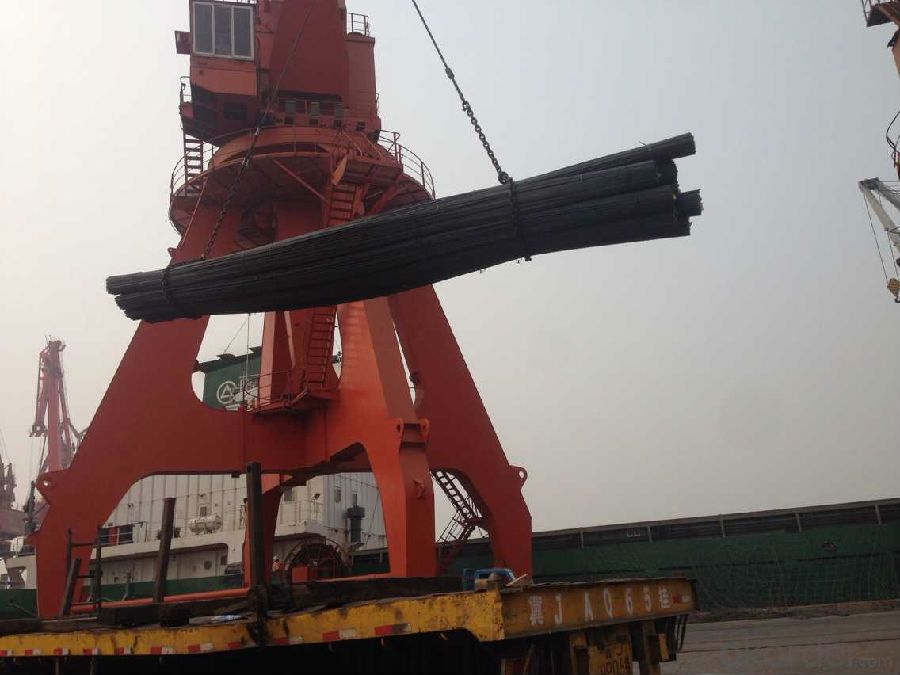
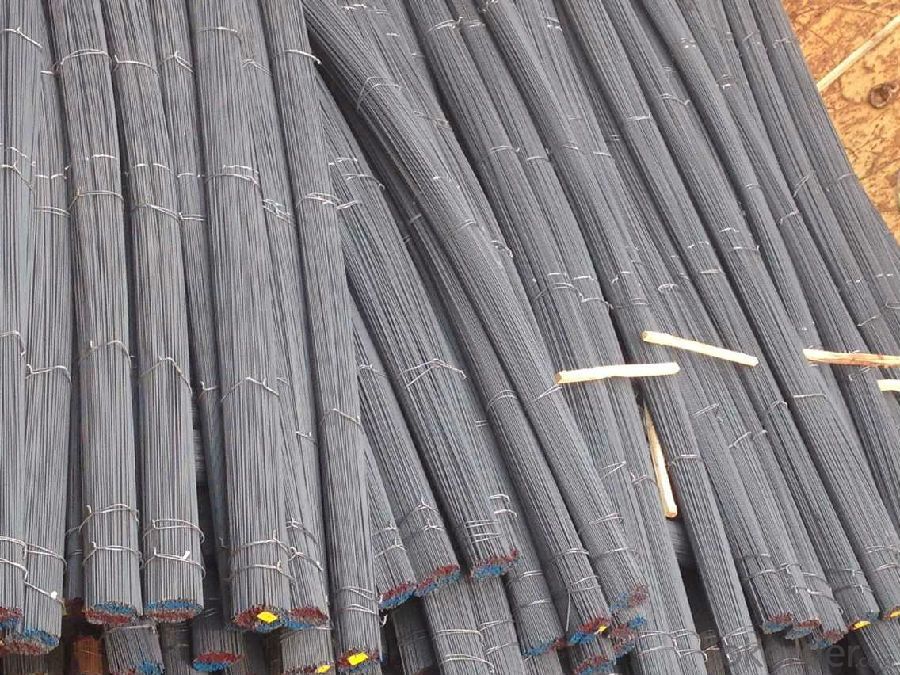
- Q:How are steel rebars protected against chemical attacks?
- Steel rebars are protected against chemical attacks through a process called corrosion protection. This involves using various techniques and materials to prevent the rebar from coming into contact with corrosive substances that can cause chemical attacks. One common method of protection is the use of protective coatings. This involves applying a layer of material, such as epoxy or zinc, onto the surface of the rebar. These coatings act as a barrier, preventing corrosive substances from reaching the steel surface. Additionally, these coatings can provide an extra layer of protection against moisture and other environmental factors that can contribute to corrosion. Another method of protection is the use of corrosion inhibitors. These are chemicals that can be added to the concrete mix or applied directly to the rebar. Corrosion inhibitors work by forming a protective layer on the surface of the steel, which inhibits the process of corrosion. These inhibitors can be organic or inorganic compounds and are designed to target specific types of corrosion mechanisms. In some cases, stainless steel rebars are used as a measure of protection against chemical attacks. Stainless steel has a higher resistance to corrosion compared to regular steel rebars. This is due to the presence of chromium, which forms a passive layer on the surface of the steel, protecting it from chemical reactions. Stainless steel rebars are often used in highly corrosive environments, such as marine structures or wastewater treatment plants. Regular maintenance and inspection are also crucial in protecting steel rebars against chemical attacks. Any signs of damage or corrosion should be addressed promptly. Regular cleaning and removal of any corrosive substances that accumulate on the rebars can also help prevent chemical attacks. Overall, a combination of protective coatings, corrosion inhibitors, stainless steel rebars, and regular maintenance is essential in protecting steel rebars against chemical attacks. These measures help to extend the lifespan of the rebars and ensure the structural integrity of concrete structures.
- Q:How do steel rebars affect the overall noise insulation of a structure?
- Steel rebars have a minimal impact on the overall noise insulation of a structure. This is because noise insulation primarily depends on the density and thickness of the materials used in the construction of walls, floors, and ceilings. Steel rebars, being used to reinforce concrete structures, do not significantly contribute to the sound insulation properties of a building. The primary function of steel rebars is to provide strength and stability to the concrete, ensuring its structural integrity. They are typically embedded within the concrete, resulting in their presence throughout the building's framework. However, the steel rebars themselves do not possess any sound-absorbing or sound-blocking characteristics. To enhance the noise insulation of a structure, other sound insulation materials such as insulation boards, acoustic panels, or soundproofing materials need to be incorporated into the building design. These materials are specifically designed to absorb or block sound waves, reducing the transmission of noise from one area to another. While steel rebars may not directly contribute to noise insulation, they indirectly play a role in maintaining the overall structural integrity of a building. A well-constructed and sturdy structure can help minimize vibrations and sound transmission caused by external noise sources. Therefore, while steel rebars themselves do not significantly affect noise insulation, their presence indirectly contributes to a more solid and stable building, which can help reduce structural vibrations and unwanted noise.
- Q:What are the limitations of using steel rebars?
- One limitation of using steel rebars is their susceptibility to corrosion. Over time, exposure to moisture and chemicals can cause the steel rebars to rust, which weakens their structural integrity. Additionally, steel rebars are heavy and can be difficult to handle and transport, especially in large construction projects. Lastly, steel rebars have a high thermal conductivity, which can lead to temperature changes causing expansion and contraction, potentially resulting in cracks or damage to the surrounding concrete.
- Q:What is the tensile strength of a steel rebar?
- The tensile strength of a steel rebar typically ranges from 400 to 600 megapascals (MPa).
- Q:What are the guidelines for preventing steel rebars from rusting during construction?
- There are several guidelines that can be followed to prevent steel rebars from rusting during construction. These guidelines include: 1. Proper storage: Steel rebars should be stored in a dry and covered area in order to protect them from moisture. It is important to keep them off the ground and away from any sources of water, such as puddles or wet concrete. 2. Surface preparation: Before installing the rebars, it is necessary to inspect them for any signs of rust or corrosion. If any are found, they should be cleaned using a wire brush or sandblasting to remove the rust and create a clean surface for proper adhesion. 3. Coating: Applying a protective coating to the rebars can help prevent rusting. This can be done using epoxy, zinc, or other anti-corrosion coatings. It is important to apply the coating evenly and according to the manufacturer's instructions. 4. Proper spacing: When placing rebars in concrete, it is crucial to ensure that they are spaced adequately to allow for proper ventilation and to prevent moisture from being trapped between them. The spacing should be in accordance with the design specifications or as recommended by structural engineers. 5. Adequate concrete cover: The rebars should have a sufficient concrete cover to protect them from moisture and corrosion. The thickness of this cover should meet the design requirements and should be maintained throughout the construction process. 6. Proper curing: After the rebars are installed, it is important to properly cure the concrete to ensure it reaches its maximum strength and durability. Proper curing methods, such as using curing compounds or covering the concrete with plastic sheeting, can help prevent moisture penetration and rusting of the rebars. 7. Regular inspections: Regular inspections of the rebars should be conducted during construction to identify any signs of rust or corrosion. If any are found, appropriate measures should be taken to address the issue promptly and prevent further damage. By following these guidelines, construction professionals can minimize the risk of steel rebars rusting during construction, thus ensuring the structural integrity and longevity of the project.
- Q:How do steel rebars affect the overall aesthetics of a structure?
- Steel rebars typically do not have a direct impact on the overall aesthetics of a structure as they are usually hidden within the concrete. However, they play a crucial role in providing structural integrity, durability, and reinforcement to the building. The proper placement and alignment of rebars ensure that the structure can withstand various loads and forces, thus enhancing its safety and longevity. While rebars may not contribute directly to the aesthetics, their presence indirectly influences the overall appearance by enabling the construction of architecturally intricate and visually appealing designs.
- Q:Can steel rebars be used in underground parking garage construction?
- Yes, steel rebars can be used in underground parking garage construction. Steel rebars are commonly used in the construction of reinforced concrete structures, including underground parking garages, to provide strength and durability to the concrete. The rebars are embedded within the concrete to resist tension and enhance the overall structural integrity of the garage.
- Q:Can steel rebars be used in architectural or decorative concrete applications?
- Yes, steel rebars can be used in architectural or decorative concrete applications. They provide structural reinforcement and enhance the overall strength and durability of the concrete. Additionally, when properly designed and installed, steel rebars can be concealed or incorporated into the design, making them suitable for various aesthetic purposes in architectural or decorative concrete projects.
- Q:How do steel rebars help in load distribution within a structure?
- Steel rebars help in load distribution within a structure by providing reinforcement and strength to the concrete. They are embedded within the concrete to enhance its tensile strength and prevent cracking or failure under heavy loads. The rebars act as a framework, distributing the applied load across a larger area and reducing stress concentrations, thereby ensuring the stability and durability of the structure.
- Q:Can steel rebars be used in industrial construction?
- Yes, steel rebars are commonly used in industrial construction. They provide strength, durability, and structural support to reinforced concrete structures, making them ideal for heavy-duty applications in industrial settings.
1. Manufacturer Overview |
|
|---|---|
| Location | |
| Year Established | |
| Annual Output Value | |
| Main Markets | |
| Company Certifications | |
2. Manufacturer Certificates |
|
|---|---|
| a) Certification Name | |
| Range | |
| Reference | |
| Validity Period | |
3. Manufacturer Capability |
|
|---|---|
| a)Trade Capacity | |
| Nearest Port | |
| Export Percentage | |
| No.of Employees in Trade Department | |
| Language Spoken: | |
| b)Factory Information | |
| Factory Size: | |
| No. of Production Lines | |
| Contract Manufacturing | |
| Product Price Range | |
Send your message to us
Deformed Steel Rebars for Construction Concrete
- Loading Port:
- China main port
- Payment Terms:
- TT OR LC
- Min Order Qty:
- 100 m.t.
- Supply Capability:
- 10000 m.t./month
OKorder Service Pledge
OKorder Financial Service
Similar products
New products
Hot products
Related keywords
